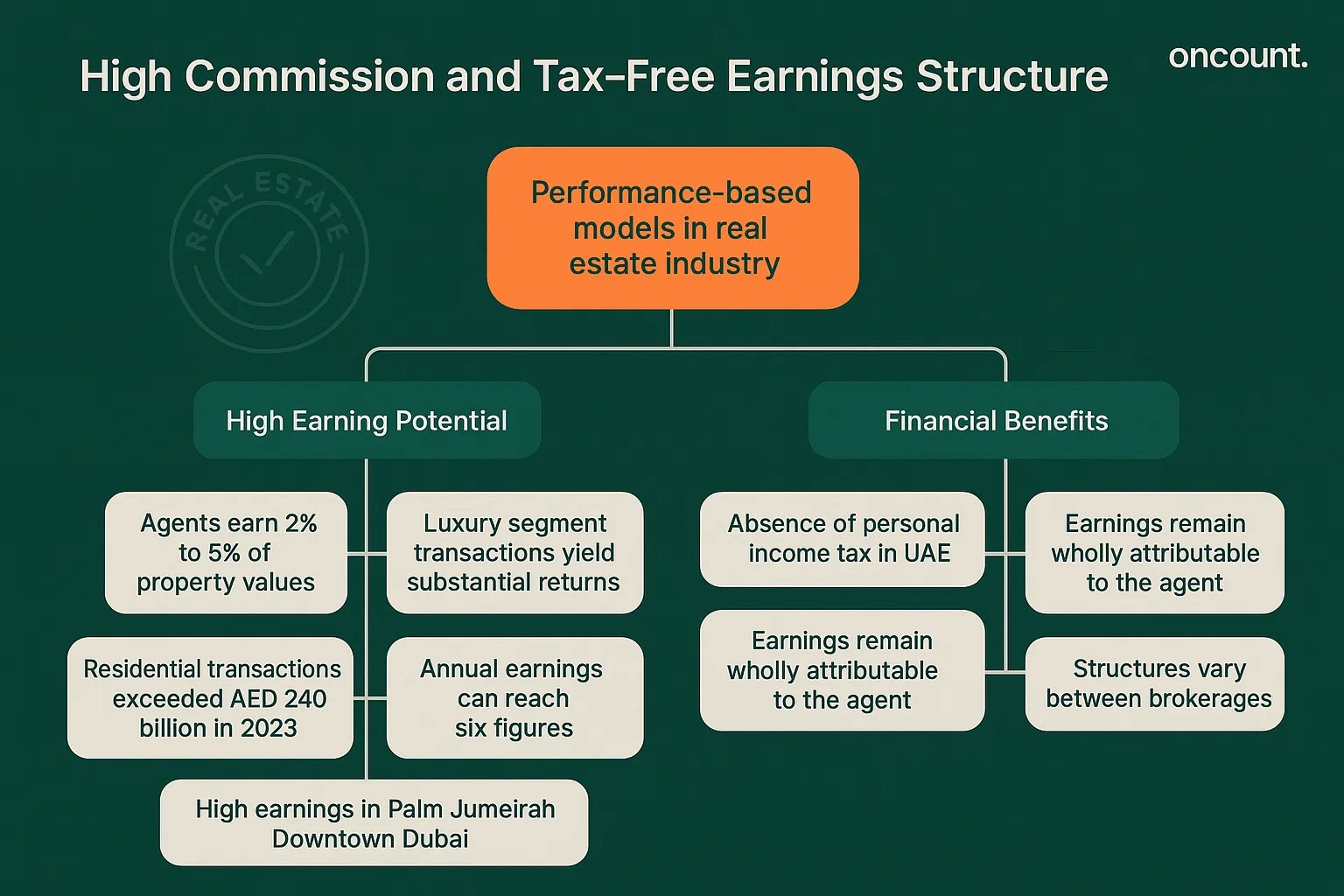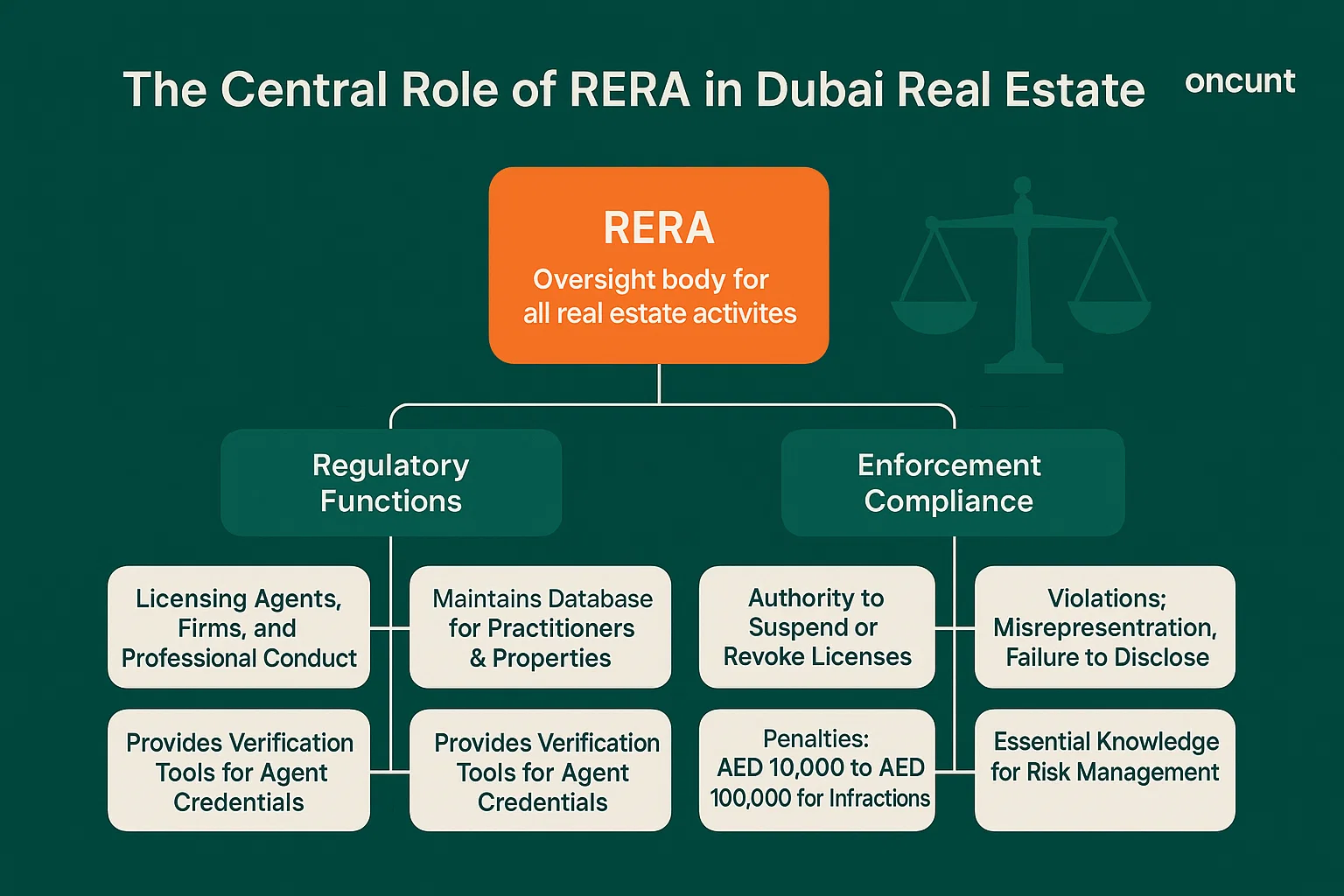Why Become a Real Estate Agent in Dubai
The emirate’s property landscape presents substantial opportunities for commission-driven professionals. With transaction volumes maintaining steady growth and international investment flowing into residential and commercial developments, qualified agents find themselves positioned within a market characterized by high-value deals and diverse client portfolios.
High Commission and Tax-Free Earnings

Compensation structures in Dubai’s real estate industry typically operate on performance-based models. Agents earn commissions ranging from 2% to 5% of property values, with luxury segment transactions often yielding substantial returns. The absence of personal income tax in the UAE means that earnings remain wholly attributable to the agent, creating a financially attractive proposition compared to markets where tax obligations significantly reduce net income.
According to data from the Dubai Land Department, residential property transactions exceeded AED 240 billion in 2023, reflecting sustained market activity. For agents closing multiple deals annually, particularly in premium districts such as Palm Jumeirah, Downtown Dubai, or Dubai Marina, annual earnings can reach six figures. Commission structures vary between brokerages, with some offering tiered percentages based on performance thresholds or portfolio specialization.
Career Growth in the Real Estate Sector
The pathway from entry-level agent to senior broker or brokerage principal offers clear progression opportunities. Experienced professionals often transition into specialized roles focusing on commercial leasing, property management, or investment advisory services. The real estate regulatory framework established by the Real Estate Regulatory Agency (RERA) provides structured advancement through different licensing categories, each corresponding to increased responsibilities and earning potential.
Senior brokers frequently establish their own registered real estate brokerage firms after accumulating market knowledge and client relationships. The Dubai Land Department facilitates brokerage registration for qualified individuals meeting capital requirements and regulatory compliance standards. This progression allows successful agents to build proprietary businesses while maintaining oversight of junior practitioners.
Market Insights and Trends in Dubai Real Estate

Understanding cyclical patterns, regulatory shifts, and demand drivers constitutes essential knowledge for practitioners. Dubai’s real estate market operates within frameworks influenced by government initiatives, financing conditions, and geopolitical factors affecting regional investment flows. The introduction of long-term residency visas, including the Golden Visa program, has directly impacted buyer demographics and property preferences.
Recent market analysis indicates growing demand for sustainable developments aligned with Dubai Clean Energy Strategy 2050 targets. Properties featuring energy-efficient systems and green certifications command premium positioning. Additionally, the emergence of purpose-built communities with integrated amenities reflects evolving buyer expectations, particularly among millennial and expatriate purchasers seeking lifestyle-oriented residences.
Agents who develop insight into the city’s real estate dynamics—including off-plan project performance, mortgage rate fluctuations, and secondary market inventory levels—gain competitive advantages when advising clients. Subscription to Dubai Land Department market reports and RERA updates ensures practitioners remain informed regarding transactional volumes, price indices, and regulatory modifications.
Eligibility Requirements and Process to Become a Real Estate Agent
Regulatory authorities impose specific prerequisites that candidates must satisfy before entering the profession. These standards ensure that individuals possess the legal standing, foundational knowledge, and ethical qualifications necessary for client representation in property transactions.
Age and Educational Qualifications
Applicants must be at least 21 years of age to qualify for agent registration. Educational requirements mandate a minimum of secondary school completion, with high school certificates requiring attestation by UAE authorities if obtained internationally. While a bachelor’s degree is not mandatory, candidates holding tertiary qualifications in business administration, finance, or related disciplines often find the theoretical knowledge beneficial when navigating complex transaction structures.
The Real Estate Regulatory Agency does not impose nationality restrictions, allowing both UAE nationals and expatriate residents to apply for a real estate license in Dubai. However, residency status remains a non-negotiable requirement, as detailed in subsequent sections.
Obtain Residency Visa and Emirates ID
Operating as a real estate agent in Dubai requires valid residency status within the UAE. Candidates must secure an employment or investor visa through their sponsoring brokerage or alternative legal arrangements. The Emirates ID card serves as the primary identification document throughout the licensing process and must remain current during the agent’s active practice period.
Sponsorship typically occurs through the registered real estate brokerage that employs the agent. Larger firms maintain streamlined visa processing capabilities and handle documentation requirements on behalf of new hires. Independent practitioners considering freelance arrangements should note that the UAE regulatory framework requires agents to be employed by a registered real estate brokerage—freelance real estate agents cannot operate independently without formal brokerage affiliation and sponsorship.
The visa application process involves medical fitness testing, Emirates ID biometric registration, and approval from relevant immigration authorities. Processing timelines vary but generally require four to six weeks for completion. Agents should initiate visa procedures concurrently with training enrollment to minimize delays in obtaining active licensure.
Clean Legal Record and Certificate of Good Conduct
Character requirements mandate that applicants maintain unblemished legal histories. The Real Estate Regulatory Agency requires submission of a police clearance certificate demonstrating the absence of criminal convictions. UAE residents must obtain this document from local police departments, while international applicants need equivalent certificates from their countries of origin, authenticated through UAE embassy channels.
This certificate of good conduct undergoes verification during the license application review. Convictions related to fraud, financial crimes, or property-related offenses typically result in application rejection. The regulatory emphasis on ethical standards reflects the fiduciary nature of agent responsibilities and the need to protect consumer interests within property transactions.
RERA Certified Training and Exam Guide
Mandatory educational requirements form the cornerstone of professional qualification. The regulatory framework administered by RERA ensures that all practicing agents complete standardized training that covers legal obligations, transactional procedures, and ethical conduct standards.
DREI Certified Training Course Overview
The Dubai Real Estate Institute (DREI), operating under the umbrella of the Dubai Land Department, delivers the official certified training for real estate professionals. The core curriculum spans approximately 60 to 80 hours of instruction covering:
- UAE real estate laws and RERA regulations governing agent conduct
- Property valuation methodologies and market analysis techniques
- Contractual frameworks including sale agreements, lease contracts, and tenancy law
- Anti-money laundering (AML) compliance and customer due diligence requirements
- Professional ethics and consumer protection standards
- Marketing practices and client relationship management
The training course approved by the Dubai Real Estate Institute utilizes a combination of classroom instruction and practical case studies. Content delivery emphasizes application of regulatory knowledge to real-world scenarios that agents encounter during property transactions. Instructors typically include experienced brokers, legal professionals, and RERA compliance specialists who provide practical insights into market practices.
Registration and Attendance of the Course
Candidates register for the DREI certified training through approved training centers affiliated with the institute. Several accredited providers offer scheduling flexibility, including weekend and evening sessions designed to accommodate working professionals. Registration requires submission of passport copies, Emirates ID, educational certificates, and payment of course fees typically ranging from AED 4,000 to AED 6,000.
Attendance requirements are strictly enforced, with participants must complete at least 80% of scheduled hours to qualify for examination eligibility. The RERA agent registration training center maintains attendance records and issues course completion certificates only upon satisfying this threshold. Candidates should anticipate a commitment of two to three weeks for full-time programs or extended timelines for part-time schedules.
Interactive components include role-playing exercises simulating client consultations, property viewings, and negotiation scenarios. These practical modules prepare candidates for the operational realities of working in Dubai’s competitive real estate market while reinforcing regulatory compliance principles.
Prepare and Pass the RERA Exam: What to Expect
Upon completing certified training, candidates become eligible to sit for the real estate brokerage exam administered by the Real Estate Regulatory Agency. The assessment evaluates comprehension of regulatory frameworks, legal obligations, and professional standards covered during the training course.
The exam format consists of multiple-choice questions covering:
- RERA regulations and licensing requirements
- Dubai real estate laws including Law No. 26 of 2007 regulating the real estate sector
- Tenancy law provisions under Law No. 26 of 2007 and subsequent amendments
- Property transaction procedures and documentation requirements
- Ethical conduct and consumer protection obligations
Passing thresholds typically require achieving a minimum score of 70%. Candidates who do not pass the real estate regulatory assessment on their first attempt may schedule retakes, though additional fees apply. Preparation strategies should include thorough review of training materials, particularly sections addressing regulatory violations, agent responsibilities, and contractual obligations.
Study groups organized through training centers or online forums provide collaborative learning opportunities. Many successful candidates report that dedicating 20 to 30 hours of review beyond course attendance significantly improves examination performance. Focus areas should prioritize understanding of RERA administrative procedures, penalty structures for non-compliance, and specific requirements governing property marketing and client fund handling.
Real Estate Regulatory Agency (RERA) Role

Established under the Dubai Land Department, RERA functions as the primary oversight body for all real estate activities within the emirate. The agency’s mandate encompasses broker and agent licensing, brokerage firm registration, consumer complaint adjudication, and enforcement of professional conduct standards.
RERA maintains comprehensive databases tracking licensed practitioners, registered properties, and transactional records. This infrastructure enables transparent market operations and provides consumers with verification tools to confirm agent credentials before engaging services. The agency also publishes regular updates regarding regulatory modifications, fee structures, and compliance requirements that affect practicing agents.
Disciplinary authority vested in RERA includes suspension or revocation of licenses for violations including unauthorized practice, misrepresentation, failure to disclose material facts, or breach of fiduciary duties. The regulatory framework imposes substantial penalties—ranging from AED 10,000 to AED 100,000—for serious infractions. Understanding the scope of RERA’s enforcement powers and complaint procedures constitutes essential knowledge for risk management and professional longevity.
Choosing a Real Estate Brokerage Firm in the UAE
Affiliation decisions significantly impact career trajectories, commission structures, and professional development opportunities. The selection process should involve careful evaluation of brokerage reputations, support systems, and alignment with individual career objectives.
How to Join a Real Estate Brokerage Agency
The application process begins with identifying registered real estate brokerage firms seeking to expand their agent rosters. Larger organizations such as Emaar Properties, Damac Properties, and international franchises including Coldwell Banker and Keller Williams maintain active recruitment programs. Boutique brokerages specializing in luxury properties or specific geographic areas may offer more personalized training and mentorship arrangements.
Candidates should prepare professional resumes highlighting relevant sales experience, language capabilities, and market knowledge. While prior real estate experience is not mandatory, demonstrating transferable skills in client relationship management, negotiation, or financial services strengthens applications. Interviews typically assess interpersonal abilities, motivation levels, and understanding of Dubai’s property landscape.
Employment contracts specify commission splits, administrative support provisions, marketing budget allocations, and continuing education requirements. Standard arrangements involve commission sharing where the brokerage retains a percentage—typically 30% to 50%—of gross earnings in exchange for providing office infrastructure, listing access, legal support, and brand recognition. New agents should clarify whether the brokerage covers licensing fees, visa costs, and ongoing training expenses.
Key Questions to Ask a Brokerage
Due diligence during brokerage selection should address:
- Commission Structure and Payment Terms: What percentage splits apply to different transaction types? Are there graduated commission tiers based on performance? How quickly are commissions disbursed following transaction closure?
- Training and Mentorship: Does the firm provide onboarding programs for new agents? Are senior brokers available for guidance on complex deals? Does the brokerage offer specialized training with the Dubai Real Estate Institute or other professional development resources?
- Marketing Support: What marketing materials and platforms does the brokerage supply? Are agents provided with CRM systems, listing syndication, or lead generation tools? Do individual agents receive marketing budgets?
- Administrative Infrastructure: Will the brokerage handle contract drafting, legal compliance, and transaction documentation? What support exists for navigating Dubai Land Department procedures and RERA reporting obligations?
- Exclusive Listings and Portfolio Access: Does the firm maintain exclusive developer relationships or proprietary listings? What percentage of business derives from walk-in clients versus agent-generated leads?
These inquiries help candidates assess whether a particular brokerage aligns with their working style, career ambitions, and compensation expectations.
The Requirement to Be Sponsored by a Broker
UAE regulations mandate that agents operate under the sponsorship of a registered real estate brokerage. This requirement reflects the regulatory principle that brokerages—not individual agents—bear primary liability for transactional compliance and consumer protection obligations.
The sponsorship arrangement means that individuals cannot be a freelance real estate agent operating independently without formal brokerage affiliation. Attempts to conduct property transactions outside registered brokerage frameworks constitute violations subject to penalties under RERA regulations. The sponsoring broker must be a licensed entity maintaining good standing with the Real Estate Regulatory Agency and possessing valid brokerage registration.
For agents aspiring to independent practice, the pathway requires accumulating experience, obtaining a broker license, and establishing a registered real estate brokerage that complies with capitalization requirements and regulatory standards. This progression typically occurs after several years of successful practice and development of substantial client relationships.
Getting Your Real Estate Agent License in Dubai: Application Process
Following completion of training and examination, candidates proceed through formal licensing procedures administered by RERA and the Dubai Land Department. Understanding these steps ensures timely application processing and avoids common documentation errors that cause delays.
Application Submission and Trakheesi Registration
License applications are submitted online through the Dubai Land Department’s Trakheesi system, which serves as the comprehensive platform for real estate transactions and agent registration. The application process requires uploading:
- Valid passport and Emirates ID copies
- DREI training completion certificate
- RERA exam passing certificate
- Certificate of good conduct (police clearance)
- Educational qualification documents (attested if obtained outside the UAE)
- Employment contract from sponsoring brokerage
- Passport-sized photographs meeting biometric standards
The Trakheesi registration portal generates a unique agent identification number upon preliminary application acceptance. Applicants must ensure that all documentation submitted bears current validity, as expired credentials result in automatic rejection requiring resubmission and additional processing time.
The sponsoring brokerage plays an active role in the application process, submitting verification of employment and confirming the agent’s association with the firm. Coordination between the applicant and brokerage administrative staff helps streamline documentation assembly and submission.
Cost of the Real Estate Broker License and Fees
Financial commitments associated with obtaining licensure include multiple components:
- Training Course Fees: AED 4,000 to AED 6,000 depending on provider and schedule format
- RERA Examination Fee: Approximately AED 2,000 for initial attempt; retakes incur additional charges
- License Application Fee: AED 3,000 to AED 5,000 annually for agent licenses; broker licenses command higher fees
- Administrative Processing: AED 500 to AED 1,000 for documentation processing and ID card issuance
Total initial costs typically range from AED 10,000 to AED 15,000 when accounting for training, examination, licensing, and associated administrative expenses. Agents should clarify with their sponsoring brokerages whether the firm covers any portion of these costs as part of employment agreements.
Annual renewal requirements mean that agents must budget for recurring license fees and any mandatory continuing education courses. The cost to renew your real estate broker license includes verification of ongoing employment with a registered brokerage and confirmation that the agent maintains good standing with RERA.
Receiving Your Official RERA Broker ID
Upon successful application review and fee payment, RERA issues the official broker identification card. This credential contains the agent’s photograph, unique RERA number, expiration date, and security features preventing counterfeiting. The broker ID must be prominently displayed during property viewings, client meetings, and all professional activities.
Processing timelines from application submission to ID issuance typically span two to four weeks, assuming complete documentation and no compliance issues. Agents receive their real estate broker license activation through the Trakheesi portal, enabling access to Dubai Land Department transaction systems and listing databases.
The RERA number serves as the primary identifier for all professional activities. Clients can verify agent credentials by searching this number on the Dubai Land Department website, promoting transparency and consumer confidence. Marketing materials, business cards, and digital profiles must include the RERA number in accordance with regulatory requirements governing professional identification.
Skills for Success as a Real Estate Agent/Broker
Technical qualifications and regulatory compliance form necessary foundations, but sustainable success requires cultivation of interpersonal capabilities, market knowledge, and business development competencies.
Building Your Network and Client Growth
Client acquisition strategies distinguish top-performing agents from those struggling to generate consistent transaction volumes. Networking opportunities in Dubai include:
- Property Exhibitions and Developer Events: Major developers regularly host launch events for new projects where agents connect with potential buyers and industry professionals.
- Business Networking Groups: Organizations such as BNI (Business Network International) chapters throughout Dubai facilitate cross-industry relationships that generate referrals.
- Community Engagement: Participation in residents’ associations, sports clubs, and cultural organizations builds personal relationships that evolve into professional opportunities.
- Digital Platforms: LinkedIn profiles optimized for real estate services attract inbound inquiries from professionals relocating to Dubai or seeking investment properties.
Successful real estate agents maintain systematic client relationship management practices. CRM systems track lead sources, follow-up schedules, and transaction histories, ensuring that no opportunities fall through administrative gaps. Regular communication with past clients generates repeat business and referrals—studies indicate that 70% of business for established agents derives from repeat clients and referrals rather than new lead generation.
Personal Branding and Digital Marketing
Differentiation in Dubai’s competitive real estate market requires strategic positioning. Agents should develop specializations focusing on:
- Geographic Expertise: Deep knowledge of specific communities (e.g., Arabian Ranches, Dubai Marina, Business Bay) positioning the agent as the neighborhood authority
- Property Categories: Specialization in luxury villas, commercial office space, or off-plan investments creating niche expertise
- Client Demographics: Focus on specific buyer segments such as European expatriates, GCC investors, or corporate relocation clients
- Digital marketing channels essential for modern practice include:
- Website Development: Professional websites featuring property listings, market insights, and contact information establish credibility and support SEO visibility for searches related to real estate services in Dubai.
- Social Media Presence: Instagram and Facebook platforms enable visual property showcasing, with video content demonstrating neighborhood features and property walkthroughs.
- Content Marketing: Blog posts analyzing market trends, buying guides, and investment analyzes position agents as knowledgeable advisors rather than mere transaction facilitators.
- Email Campaigns: Regular newsletters updating clients about new listings, market reports, and regulatory changes maintain ongoing engagement.
Compliance considerations apply to all marketing materials. RERA regulations prohibit misleading property descriptions, unverifiable claims regarding returns or appreciation, and failure to disclose material property defects. All advertisements must include the agent’s RERA number and sponsoring brokerage identification.
Legal Compliance and Agent Code of Conduct
Adherence to regulatory standards protects both clients and practitioners from legal exposure. Key compliance areas include:
- Disclosure Obligations: Agents must inform clients of all material facts affecting property value, including pending development projects, legal encumbrances, or community fee arrears.
- Fiduciary Duties: Agency relationships impose obligations to prioritize client interests, maintain confidentiality, and avoid conflicts of interest.
- Transaction Documentation: Proper contract execution, deposit handling procedures, and adherence to escrow requirements prevent disputes and regulatory violations.
- Anti-Money Laundering (AML): Customer due diligence requirements mandate identity verification, source of funds documentation, and suspicious activity reporting in accordance with UAE AML regulations.
The RERA Code of Ethics establishes behavioral standards governing professional conduct. Violations including misrepresentation, unauthorized practice, commission disputes, or failure to maintain proper records trigger investigations that may result in license suspension. Agents employed by a registered real estate brokerage benefit from compliance infrastructure and legal support that individual practitioners would need to establish independently.
Continuing education requirements ensure that agents remain current regarding regulatory modifications and market practices. While specific continuing education mandates vary, participation in professional development programs strengthens capabilities and demonstrates commitment to professional standards.





